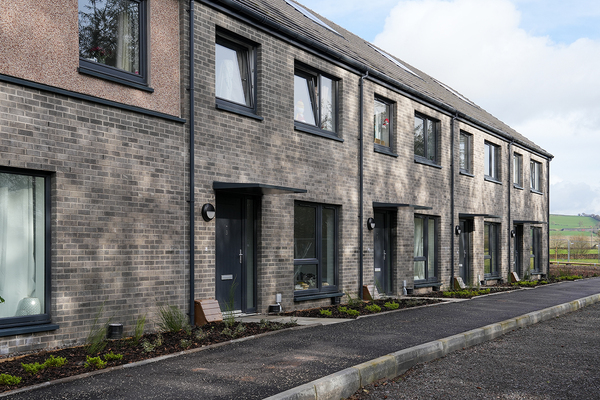You are viewing 1 of your 1 free articles

Paul Brocklehurst is chair of the Land, Planning and Development Federation (LPDF)
LURA: it’s Labour’s problem now
The Levelling Up and Regeneration Bill (LURB) received Royal Assent has become the Levelling Up and Regeneration Act (LURA). But aside from having to use a different acronym, what long-term impact will the LURA have on a housing industry at a unique point of crisis, asks Paul Brocklehurst
The Levelling Up and Regeneration Bill turned into a legislative behemoth. Yet despite being one of the most amended pieces of legislation in recent memory, the final product lacked direction, was vague in concept, and its central policies fell short of what is really required.
While I welcome its ambition to address the housing crisis – one of the biggest social crises of our time – the act itself, sadly, simply doesn’t cut the mustard.
The Infrastructure Levy, for example, aims to increase much-needed affordable housing and infrastructure for communities across the UK. It will involve a succession of ‘test and learn’ pilot schemes rolled out over the course of a decade. This is a risky approach. At the end of this learning exercise, the harsh reality is that we may end up with far less affordable housing than we would if we just maintained the status quo.
The National Development Management Policies (NDMPs) are a similar story. Aimed at simplifying and speeding up the planning application process by removing bottlenecks, it’s an exciting development, in theory. In reality, it could lead to improper consultation and allow local planning authorities to have too much flexibility in how they apply these supposedly national policies.
Big questions remain over the act’s efficacy, certainty and speed. The government’s consultation on environmental outcome reports (held in March) still awaits a response, and we are yet to hear the detail on how the reports will be applied in practice. With the industry waiting on one consultation outcome after another, we’re braced for the future to remain uncertain for some time to come.
“While I welcome its ambition to address the housing crisis – one of the biggest social crises of our time – the act itself, sadly, simply doesn’t cut the mustard”
Ultimately, even in its final form, the act lacks detail. Perhaps this is because the government tried to push the bill through before parliament prorogued in October – with the ‘need for speed’ quashing much-needed consideration and scrutiny. And so, after years of waiting and debating, it seems we are still not getting the clarity or certainty that we so desperately need.
While LURA was being deliberated, I spoke to a myriad of stakeholders from both houses, and across all parties. One thing was abundantly clear: peers and MPs alike are frustrated with the lack of flexibility in the bill to accommodate, what they considered, necessary changes.
As with many recent government announcements, the LURA has left us with more questions than answers. It now falls on government to give the industry some reassurance.
To start, the government should introduce a written ministerial statement that emphasises the importance of affordable housing delivery. It would also be wise to strengthen the presumption in favour of sustainable development and expedite the application process for sites allocated in the adopted local plan.
But in many ways, these are only transitional arrangements. The LURA was notable for its use of secondary powers, in which the secretary of state was given ‘powers to introduce’, ‘powers to regulate’ and ‘powers to designate’.
With government rapidly approaching a general election – and the Department for Levelling Up, Housing and Communities focusing its energies on pushing through the Renters’ Reform Bill and the Leasehold and Freehold Reform Bill – I, for one, am sceptical these powers will ever be exercised by Michael Gove.
It looks like the intricacies of the LURA will become yet another can kicked down the proverbial road of UK politics. Inevitably, these regulations will need to be picked up by the next government, which is likely to be a Labour one. This poses the question of whether Labour will be willing to commit to the measures at all. The Infrastructure Levy, for instance, was widely criticised by Labour for being unlikely to deliver affordable housing at scale. So will they back it if they’re in power?
“It looks like the intricacies of the LURA will become yet another can kicked down the proverbial road of UK politics”
Labour has committed to “back the builders, not the blockers”. It is arguable that some of the reforms set out in the LURA, if not enacted properly, could end up doing the opposite. At the very least, committing to the LURA could take up valuable civil service and take political resource away from any other reforms they plan to pledge.
Labour has recognised the need to bring local thinking back to the heart of planning and has outlined steps to build on a mixture of potential sites. At the recent party conference in Liverpool, Labour leader Sir Keir Starmer argued that the only way to deliver the houses Britain needs is on a blend of brownfield and greenfield sites. Meanwhile, reforms like NDMPs offer an opportunity for central government to put its stamp and leave a lasting legacy on planning policy.
If a Labour government can negotiate some of the trickier aspects of the act and sensibly enact the reforms outlined in the LURA in line with their larger housing ambitions, there is every possibility of turning an inherited problem into a major political opportunity. Of course, it all remains to be seen, with other priorities front-of-mind for the majority of parliament. For now, the wait, and the worry, continues.
Paul Brocklehurst, chair, Land, Planning and Development Federation (LPDF)
Sign up for our daily newsletter
Already have an account? Click here to manage your newsletters












